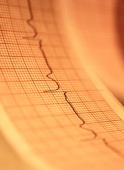Smartphone and standard ECGs detect atrial rate and rhythm, AV block, QRS delay with equal accuracy
MONDAY, Feb. 9, 2015 (HealthDay News) — Wireless, single-lead real-time smartphone electrocardiogram (ECG) monitoring accurately detects baseline intervals and atrial rate and rhythm, according to a study published online Feb. 5 in the Journal of Cardiovascular Electrophysiology.
Zachary C. Haberman, from the Keck School of Medicine of USC in Los Angeles, and colleagues compared the standard 12-lead ECG to the smartphone ECG in 381 participants, including healthy young adults, elite athletes, and cardiology clinic patients. An iPhone case or iPad was used to obtain 30-second lead I ECG waveforms. Immediately after the smartphone tracing was obtained, standard 12-lead ECGs were acquired. Two board-certified electrophysiologists adjudicated the de-identified ECGs.
The researchers found that atrial rate and rhythm, atrioventricular block, and QRS delay were detected with equivalent accuracy by smartphone and standard ECGs. The sensitivities varied from 72 percent (QRS delay) to 94 percent (atrial fibrillation), while specificities for both modalities were all above 94 percent.
“Smartphone ECG accurately detects baseline intervals, atrial rate and rhythm and enables screening in diverse populations,” the authors write. “Efficient ECG analysis using automated discrimination and an enhanced smartphone application with notification capabilities are features that can be easily incorporated into the acquisition process.”
Copyright © 2015 HealthDay. All rights reserved.








